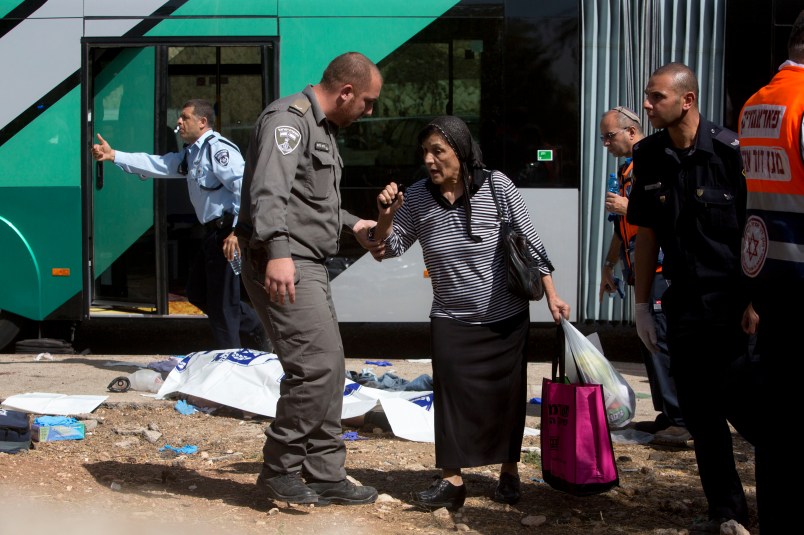JERUSALEM (AP) — A pair of Palestinian men boarded a bus in Jerusalem and began shooting and stabbing passengers, while another assailant rammed a car into a bus station before stabbing bystanders, in near-simultaneous attacks Tuesday that escalated a monthlong wave of violence. Two Israelis and one attacker were killed.
The Jerusalem attacks, along with two stabbings in a central Israeli city, marked the most serious outbreak of violence since the current round of tensions erupted. More than 10 people were wounded.
The violence, coming at a time when peace prospects appear nil, have fueled a sense of panic in Israel and raised fears that the region is on the cusp of a new round of heavy violence.
Police closed major highways leading in and out of Jerusalem, while Prime Minister Benjamin Netanyahu called an emergency meeting of his Security Cabinet, where police were to present a plan to halt the violence. Police spokeswoman Luba Samri said the country’s internal security minister, Gilad Erdan, was considering a number of immediate steps, including a closure on Arab neighborhoods in east Jerusalem, where many of the attackers have come from, and making it easier to get gun licenses.
While Israelis are on edge over the random nature of the attacks, the long-running diplomatic deadlock has left many Palestinians feeling hopeless about their chances of ending nearly half a century of Israeli occupation.
In the bus attack, police said two men, one carrying a gun and the other with a knife, boarded the vehicle and attacked passengers. Police said a 60-year-old man was killed, as was one of the attackers. The second attacker was subdued by a crowd.
Elsewhere in Jerusalem, a Palestinian motorist rammed his vehicle into a crowded bus stop, then got out and began stabbing people. One Israeli was killed, police said.
The Jerusalem attacks, coupled with a pair of stabbing attacks in the central Israeli city of Raanana that injured five, came in rapid succession. Emergency services said several of the wounded were in serious condition.
At the scene of one of the attacks, Jerusalem Mayor Nir Barkat called on the government to seal off the West Bank and certain Arab neighborhoods of east Jerusalem to quell the wave of attacks that have struck the city.
Since the Jewish New Year last month, seven Israelis have been killed and dozens wounded in a shooting, a stoning and a series of stabbings. At least 27 Palestinians been killed by Israeli fire, including 11 identified by Israel as attackers and the rest in clashes between stone-throwers and Israeli troops. Hundreds of Palestinians have been wounded in such confrontations.
On Monday, Palestinians carried out three stabbings in Jerusalem, leaving a teenage Israeli boy in critical condition.
The unrest began last month with clashes at Jerusalem’s most sensitive holy site and quickly spread across Israeland into the West Bank and Gaza Strip.
The attacks come at a time of deep despair for the Palestinians. Peace talks broke down more than a year ago, and prospects for relaunching diplomatic efforts to end the conflict appear nil. After years of diplomatic deadlock, Palestinian President Mahmoud Abbas has seen his popularity plunge.
The attackers, many of them teenagers, have had no affiliation with militant groups, and the seemingly random nature of the stabbings has made it difficult to predict or prevent them. The use of vehicles and firearms in Jerusalem on Tuesday, however, marked a more serious level of violence and bring back memories of the deadly attacks that plagued Israeli cities during last decade’s second Palestinian uprising.
Netanyahu has come under heavy criticism for failing to stop the violence, and an opinion poll this week showed that more than 70 percent of the public is dissatisfied with his handling of the crisis.
Some of the attacks have been carried out by members of Israel’s Arab minority, who frequently suffer discrimination and identify with their Palestinian brethren in the West Bank, east Jerusalem and Gaza Strip.
In a fiery speech to parliament on Monday, Netanyahu accused the country’s Arab leaders of helping incite weeks of violence.
Israeli Arab towns called a general strike Monday to protest recent tensions.
The violence erupted over the Jewish New Year last month, fueled by rumors that Israel was plotting to take over a site holy to both Muslims and Jews. The rumors ignited clashes between Israeli police and Palestinian activists who hurled stones and firebombs at them from inside the mosque, and the violence has spread.
Israel has dismissed the rumors and repeatedly said there are no plans to alter a longstanding status quo at the spot, revered by Jews as the site of the biblical Temples and today home to Islam’s Al-Aqsa Mosque compound.
Copyright 2015 The Associated Press. All rights reserved. This material may not be published, broadcast, rewritten or redistributed.







Sick of the marauding violent zionist thugs…Real reporting needs to start happening to shut them down.
No shocker that “terror” or “terrorism” wasn’t used in the article.
Lol wut?